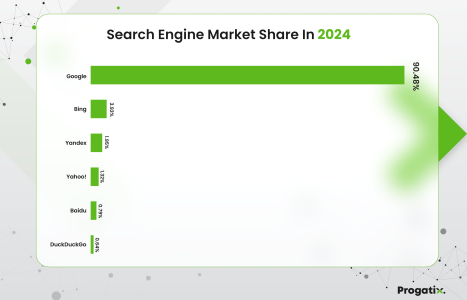SearchGPT VS Google: Who Will Dominate the Search Engine Battle? Software Development

Open AI launched SearchGPT on Thursday, July 25, 2024, as a rival to Google’s search engine. It’s a new AI search prototype that advances the model from keyword-based search to conversational search, allowing us to ask questions in natural language, the same as we would in a conversation. This is a remarkable shift from traditional search engines that require entering specific keywords to find details.
With its conversational interface, real-time web access, and translucent source attribution, SearchGPT transforms how users find information. Although it looks competent, the tool faces approval and accuracy concerns.
But can SearchGPT really compete with Google? How is SearchGPT diverse from AI Overviews? And what’s the difference between SearchGPT and ChatGPT?
Marketers, SEO professionals, and publishers are in a frenzy questioning how SearchGPT could considerably impact publisher traffic. While it has potential, Google’s search supremacy seems impossible to confront anytime soon.
Can Searchgpt Challenge Google Search’s Dominance?
Google might face competition from SearchGPT, as it targets to provide users:
- A more direct and effective search experience.
- Prompt answers instead of quarrying over multiple links.
- No ads that come with Google searches.
Lately, OpenAI has collaborated with a rising list of publishers, including Condé Nast, Associated Press, Axel Springer, The Atlantic, Dotdash Meredith, Financial Times, LeMonde, NewsCorp, Prisa Media, TIME, Vox Media and others to effortlessly discover more detailed content directly from the source.
As per Oberlo, by August 2024, Google will be the top search engine, with a market share of 90.48%. However, Google’s market share has not decreased below 90% since 2014. Google controls over 90% of all search queries globally and governs the global search engine market share.
Even an uncertain shift in market share could have a major impact on the search industry. If SearchGPT can seize just 5% to 10% of the search market, it would signify a major interference.
Let us begin with the basics. Keep reading to find the answers to all these questions.
HISTORY OF SEARCH ENGINES
1990s: The Birth of Search Engines
- 1990: Archie becomes the first search engine to list downloadable files.
- 1991: Tim Berners-Lee builds a virtual library to assist users in finding URLs.
- 1993: JumpStation offers a linear search model exhibiting page titles and headers.
- 1994: Yahoo! originated, contributing a directory of web pages; WebCrawler indexes whole pages.
- 1995: Lycos indexes 1.5 million documents. Inktomi leads pay-per-click ads.
- 1996: BackRub, the forerunner to Google, is shaped by Larry Page and Sergey Brin, emphasizing backlinks as a ranking factor.
- 1998: Google officially launches, presenting an innovative search algorithm grounded on backlinks.
Early 2000s: Google’s Rise & Search Engine Evolution
- 1999: Google acquired investment and partnered with AOL.
- 2000: Teoma search engine launches.
- 2001-2002: Excite goes bankrupt, and Yahoo! begins obtaining other search engines.
- 2003: Google launches its first key algorithm update, the “Boston” update.
- 2004: MSN Search debuts.
- 2005: MSN shifts to its own tech, and Google announces the “nofollow” tag to fight spam.
- 2007: Google launched Universal Search, which joined various content types like news, videos, and local outcomes.
2010s: AI, Mobile, and Major Algorithm Updates
- 2010: Google releases Caffeine, enhancing fresh search results.
- 2011: Google Panda update targets content farms; Google launches structured data with Schema.org.
- 2012: Google Penguin penalizes sites employing manipulative link-building.
- 2013: Google Hummingbird update enhances query comprehension with a focus on user intent.
- 2015: Mobilegeddon powers sites to become mobile-friendly. While Google RankBrain automates rankings by employing machine learning.
- 2016-2017: Google updates local search results (Possum) and disciplines spammy ads.
Late 2010s to 2020s: Privacy, AI, and Mobile-First
- 2018: BERT update enhances Google’s understanding of natural language inquiries.
- 2019: Mobile-First Indexing becomes the default; Google Analytics 4 introduces.
- 2020: Core Web Vitals evaluates mobile site performance.
- 2021: Google MUM launches AI to manage complex queries.
- 2022: Page undergoes update factors in Core Web Vitals as a ranking signal.
THE ROLE OF AI IN SEARCH ENGINE EVOLUTION
AI has revolutionized the search engine experience by moving from simple keyword-based inquiries to more intuitive, conversational, and personalized search interfaces. Leading this shift, Google has launched features such as “Circle to Search” and “AI-powered Multi-search,” enabling users to search within apps by merely emphasizing, circling, or scribbling. Multi-search pools text with images, enabling users to ask thorough questions regarding visual content and improving the accuracy and complexity of search results.
AI-driven search engines now understand natural language, grade results based on applicability and deliver personalized experiences. Also, it fulfills several requirements, from personalized shopping and language translation to manageable search for those with visual deficiencies. Though AI integration in business offers users accurate, contextually related information quicker, driving creativity and supporting educational and learning experiences.
Moving forward, key challenges like user privacy and equality in search results, emphasizing the requirement for accountable AI practices, will be addressed by AI enhancements with a promise to make search more simplified, user-friendly, and accessible for all. Besides, it will reform how we find and relate to information over the internet.
THE AI SEARCH LANDSCAPE EXTENDS: INTRODUCING SEARCHGPT
The domain of AI-powered search is thriving. Several new players are evolving from Google’s AI Overviews to Perplexity’s emphasis on insightful answers. Now, SearchGPT links the party, encouraging a unique approach to information discovery.
But with so many choices, what makes SearchGPT different?
Here are the SearchGPT’s functions, compared to Google’s AI efforts, along with its potential influences on marketing strategies.
WHAT IS SEARCHGPT?
OpenAI introduced a transitory prototype of new AI search features, SearchGPT. According to OpenAI, the tool is “planned to combine the power of AI models with information from the web to offer you fast and timely answers with clear and significant sources.”
By calling it a “new way to search,” the company further said, “Getting answers on the web can take a lot of effort, often demanding multiple attempts to get appropriate results. By improving the conversational competencies of our models with real-time information from the web, defining what you’re looking for can be faster and easier.”
HOW SEARCHGPT WORKS?
SearchGPT delivers a clean and organized interface, using a mix of technologies, including Microsoft’s Bing, for its live index, which functions differently from other AI-first search engines. The system regulates when to tap into web results based on queries, allowing users to activate web searches manually as well. Key features involve:
-
Real-Time Information
The system can access up-to-date information through its integration with Bing’s index, allowing informed responses based on real-time events.
-
Interactive Elements
Users can access features such as interactive stock graphs, maps with location pins, and dynamic data visualization.
-
Source Transparency
Results involve clickable citations connecting to original sources and a sources sidebar that allows users to browse over relevant websites.
-
Follow-up Capability
The system maintains context and can control follow-up queries to improve outcomes.
For SEO professionals, optimizing content for Bing stays significant to ensure visibility on SearchGPT, as it depends on Bing’s index for its source information.
WHAT SEARCHGPT PUT FORWARD
SearchGPT provides a fresh perspective on how we are involved with search engines. Counter to traditional AI search engines such as Google, which delivers a list of links, SearchGPT offers direct answers in a conversational manner, making it an advanced player in the search engine market.
KEY FEATURES OF SEARCHGPT
-
Conversational Search
One of the highlighted features of SearchGPT is its conversational search engine approach. Rather than providing users a list of links to scrutinize, it delivers direct, human-like responses, ensuring communications are more natural and effective.
This is mainly helpful for users seeking quick answers without the requirement for deep dives into multiple sources.
-
AI-Powered Precision
SearchGPT utilizes innovative AI models to comprehend and process natural language search queries.
Search engine accuracy is improved by its ability to recognize context and complexities, making it ideal for answering simple, fact-based queries.
The AI-powered system also unceasingly learns and adapts, refining its responses over time.
-
Real-Time Summaries
While Google outshines in providing real-time search, SearchGPT offers diverse proximity.
It can condense information from numerous sources in real-time, providing concise, digestible answers for users who prefer prompt results.
-
Simplified User Experience
Users enjoy the ad-free setting of SearchGPT, which improves the overall user experience.
By shedding away the interruptions advertisements cause, it emphasizes exclusively delivering information, besides providing cleaner and more attentive communication.
PROS AND CONS OF SEARCHGPT
SearchGPT, advanced by OpenAI, has evolved as a strong substitute for traditional search engines such as Google. Its exclusive conversational approach provides an inspirational way to search, but it still has its strengths and weaknesses.
Pros of SearchGPT:
-
Quick, Direct Answers
Unlike traditional search engines offering a list of links, SearchGPT exceeds at providing fast, direct responses to user inquiries. Its AI-powered search technology is aimed at users preferring instant answers without having to examine diverse websites.
-
Ad-Free User Experience
One of the key advantages of SearchGPT is its clean, ad-free interface, which significantly improves user experience. Users can only emphasize what they are looking for.
-
Conversational without interruptions of paid adpositional Search Capabilities
SearchGPT is known for its ability to engage in conversational search. It practices natural language search queries easily, offering human-like responses and making it convenient for users to get responses in a conversational format.
Cons of SearchGPT
-
Limited Web Index
While SearchGPT is effective for factual and simple queries, its restrictive web index compared to Google means it cannot manage more complex, research-heavy questions. Users seeking detailed analysis might find Google’s search engine precision greater.
-
Lack of Real-Time Search
SearchGPT faces challenges when providing real-time search results, especially for news updates or trending topics. Instead, Google outshines at delivering real-time, up-to-date material.
-
Difficulty with Complex Queries
Though AI search engines such as SearchGPT are advancing, they still face challenges in providing the same profundity of information for more thorough searches requiring multiple sources or comprehensive context.
USER EXPERIENCE
SearchGPT: A Conversational Approach
-
Quick, Direct Answers
SearchGPT advances based on its conversational search engine model, which provides direct, brief answers to direct questions, saving users time, particularly when fact-based inquiries such as “What is the capital of France?” are concerned. It also saved the need to browse over multiple links.
-
User-Friendly Design
By emphasizing providing answers and summaries in spite of confusing users with too many choices, such as ads cluttering, SearchGPT creates outcomes that deliver a smoother user experience.
-
Limitations in Depth
While SearchGPT manages factual and simple queries effectively, it often struggles with more encrusted searches that need in-depth exploration. This is where Google’s all-inclusive web index comes superior.
WHAT CHALLENGES DOES SEARCHGPT FACE?
While SearchGPT delivers a promising approach, it deals with several key challenges:
-
User Adoption
Encouraging users to stop using well-known search engines like Google involves a compelling value proposition and important marketing efforts.
-
Scalability
Managing a huge volume of intricate, colloquial queries in real-time offers significant technical hurdles.
-
Accuracy and Reliability
Maintaining user faith is crucial to ensuring steady accuracy, particularly for time-dependent information.
This isn’t just a trivial update; it’s a major departure from traditional search paradigms. Particularly for content creators and marketers, this could mean significant changes in optimization strategies, keyword targeting, and audience reach.
The above-given information is convincing enough to make us understand that SearchGPT does offer advanced features, but is it enough to replace Google? Let’s look in-depth into it.
Let’s create AI-driven search tools for your business!
Let's Connect
WHAT IS GOOGLE: THE SEARCH GIANT?
Google has ruled the search engine market for a very long time. It makes use of a robust indexing technology that analyzes billions of web pages every day. Google’s potential lies in its huge database and advanced ranking algorithms focusing on relevant and engaging content.
How Google Search Has Dominated the Market
Google remains the leading search engine choice for many reasons, out of which one is continuously delivering relevant, accurate, and comprehensive search results, making it essential in the search engine market. This governance is mainly because of its refined algorithms and data-driven approach to ranking content.
Key Factors behind Google’s Success are:
-
Advanced Algorithms
Google’s search algorithm is one of the most potential ones in the world. By using several factors such as content quality, backlinks, and user engagement, it evaluates a website’s significance.
This approach ensures search engine accuracy across millions of searches daily.
-
Personalization of Search Results
A key advantage Google offers is the personalization of search, which provides results based on a user’s search history, location, and preferences across other Google services.
This level of customization improves the overall user experience, making it more effective for users to find significant and relevant content rapidly.
-
Real-Time Search Results
Google outshines at delivering real-time search outcomes, particularly for breaking news, trending topics, and live updates.
It’s qualified to promptly take out information from different sources, making sure users stay educated with the most up-to-date data.
-
Comprehensive Web Index
With the leading web index, Google offers access to a wide range of content.
Users trust its capability to present results from trusted sources, making it preferable for everything from simple questions to detailed research.
HOW GOOGLE WORKS
Google is a dominant search engine that processes an extensive number of queries daily. Comprehending how Google functions can help individuals and businesses optimize their online presence. The process comprises three key stages: crawling, indexing, and ranking.
-
Crawling
Google uses crawling as the primary means of gathering data from the internet. Automated programs known as crawlers or spiders are used to search the internet systematically, including website browsing, links, and details collection about the content on each page, finding recent and updated content to add to Google’s huge database.
The crawler’s evaluation of a webpage’s HTML structure, content, and any links leading to or from the page, which is referred to as web page crawling, is considered important for comprehending the authority and validity of the page. Google uses numerous signals to regulate which pages to crawl and how often to revisit them. Factors prompting crawling involve the page’s popularity, the number of links directed to it, and the overall site structure.
-
Indexing
Once a web page is crawled, it is then indexed, known as a process of storing and organizing the information gathered by crawlers in Google’s database, which is recognized as the index. The index functions like a massive library catalog, where each page is categorized based on its content, keywords, and other relevant factors.
During indexing, Google analyzes the content to control what the page is about, besides including assessing numerous elements, such as text, images, and metadata. The purpose is to understand the context of the details and how they align with the user queries. Well-optimized pages with clear, relevant content are more likely to be indexed well, making them convenient to recover during search queries.
-
Ranking
The ranking is the closing step in Google’s search process. When a user enters a search query, Google recovers relevant pages from its index and ranks them according to numerous factors to deliver more valuable results. The ranking algorithm considers hundreds of factors, i.e., keyword relevance, content quality, user experience, mobile-friendliness, and page loading speed.
The ranking process is where search engine optimization (SEO) begins to be used. SEO incorporates strategies and techniques intended to enhance a website’s transparency and ranking in search results. Website owners get maximized possibilities of appearing on top in the search results by optimizing content with relevant keywords, enhancing site structure, and building quality backlinks.
-
The Role of SEO and Organic Results
SEO is important for driving organic traffic to websites, which are the listings that appear in search results due to their applicability to the search query rather than being paid advertisements. Users are inclined to rely on organic results more than paid ads, making high rankings significant for businesses looking to appeal to potential customers.
Effective SEO strategies include:
-
Keyword Research
Classifying the terms and phrases that potential customers are searching for and integrating them into website content.
-
Quality Content Creation
Creating valuable, instructive content that addresses user inquiries and delivers solutions.
-
Technical SEO
Make sure the website is accurately structured for search engines, including optimized meta tags, sitemaps, and mobile compatibility.
-
Link Building
Attaining backlinks from authoritative sites to improve credibility and authority in front of Google.
PROS AND CONS OF GOOGLE SEARCH
Google has been the preferred search engine for years, steadily setting high standards for search performance. However, similar to all the technologies, it comes with both strengths and limitations.
Pros of Google Search:
-
Comprehensive Search Results
Google’s huge web index makes sure users can find thorough information on almost any topic. Its refined algorithms make it extremely efficient for managing complex queries and delivering precise and reliable results.
-
Search Personalization
Google exceeds in search personalization. By evaluating users’ search history, location, and behavior across Google services, it tailors results, making searches more related to individual preferences proved to be particularly useful for finding local businesses or regularly visited websites.
-
Real-Time Search Capabilities
Google’s ability to offer real-time search results for news, live updates, and trending topics makes it different from other AI search engines. It effectively pulls data from different sources, keeping users informed on present events.
Cons of Google Search:
-
Ad Clutter
Google search results often involve ads at the top, overpowering users and sometimes making it challenging to distinguish between paid and organic results. This can destructively impact the overall user experience.
-
Over-reliance on Personalization
While search personalization provides benefits, it can also trick users into a “filter bubble,” where the outcomes are too personalized to past behavior. Such restrictions bring varied content or new outlooks.
-
Challenges with Natural Language
Although Google’s algorithm has become enhanced in comprehending natural language searches, it still infrequently faces challenges related to complex or conversational queries associated with AI-powered search engines such as SearchGPT.
USER EXPERIENCES
Google Search: A Familiar Experience
-
Breadth of Results
Google is well-known for providing comprehensive search results, making it a trusted choice for users guiding detailed research. It offers links, snippets, and multimedia resources, which give users a number of options to discover diverse perspectives.
-
Personalization and Convenience
Google’s potential lies in its search personalization. Utilizing user history, location, and preferences personalizes outcomes to enhance the user experience. For example, it goes beyond delivering local results for questions like “restaurants near me” or “directions to [location].”
-
Accuracy for Complex Queries
Google’s search engine precision is recognized when managing intricate or multi-layered searches. It collects details from varied, reliable sources, assuring the users get detailed responses even for detailed topics.
CHALLENGES FACED BY GOOGLE SEARCH ENGINE
Ad Clutter and User Experience
The existence of several ads at the top of search results can overpower users and make it challenging to differentiate between paid and organic results, leading to hindrance and a less acceptable user experience.
Misinformation and Quality Control
With the huge amount of information accessible online, Google faces challenges in sifting out misrepresentation and safeguarding users’ access to precise and trustworthy content. This is particularly critical for health-related, political, and breaking news topics.
Privacy Concerns
As users become more conscious of privacy-related concerns, Google’s data collection practices face inspection. Issues regarding how personal data is utilized and the potential for targeted advertising can prevent users who focus on privacy.
Algorithm Complexity and Transparency
Google’s algorithms are greatly complex, and the lack of visibility regarding how outcomes are ranked can lead to disapproval. Users and webmasters often find it difficult to comprehend why certain content is selected over others.
Search Personalization Limitations
While personalization can improve user experience, it can also create “filter bubbles,” exposing users to information that aligns with their preceding behaviors, limiting variety in viewpoints and information.
Adaptation to Voice and Conversational Search
The increase in voice search and conversational AI is challenging for Google in terms of adapting search algorithms to house natural language processing and context-addressable queries.
Competition from New Search Technologies
The emergence of AI-driven search technologies such as SearchGPT and other competitors is creating pressure on Google to advance and improve its contributions to keep market dominance.
Mobile Optimization and Speed
As more users access the web through mobile devices, Google must repeatedly optimize its algorithms and indexing strategies for mobile search performance and speed. Slow-loading pages can influence rankings and user satisfaction negatively.
Spam and Low-Quality Content
Having spammy or low-quality content can weaken the search experience. In spite of constant efforts to fight spam, it remains challenging to maintain high standards for content quality across the web.
Regulatory Scrutiny and Antitrust Issues
Google has encountered regulatory scrutiny and antitrust investigations in several regions, which can influence its operations and market strategies. Legal challenges might affect how Google accomplishes its search business and user data.
In order to maintain its leading position in the search engine sector and improve the user experience typically, Google must address such problems.
Transform your business with AI search
Let's Connect
CORE DIFFERENCES BETWEEN SEARCHGPT AND GOOGLE
Search Model and Results
- SearchGPT delivers direct, conversational responses, generating content from knowledgeable data to respond to queries concisely.
- Google provides a list of ranked web pages from a vast, continuously updated index for users to discover in depth.
User Experience and Interface
- SearchGPT features a chat-based interface that emphasizes providing direct, conversational answers.
- Google uses a traditional search page, offering numerous resource links throughout several media types, such as web pages, images, and videos.
Accuracy and Reliability of Results
- SearchGPT depends on trained AI models for generating answers, designed to offer concise responses but might need more context for decidedly specific or complex information.
- Google endlessly crawls and indexes web content, making it highly effective for providing updated information, especially in fast-changing topics.
- Each platform employs distinct mechanisms to address misinformation and accuracy, with Google leveraging web-wide indexing and SearchGPT based on model accuracy and limited citation of sources.
Speed and Efficiency
- SearchGPT usually delivers answers rapidly within the chat without forwarding them to external pages.
- Google might include page loading times but offers a broader possibility of information and a choice of resources for detailed exploration.
Personalization and Context Awareness
- SearchGPT provides adaptive responses based on the context of previous user queries, creating a more tailored conversation flow.
- Google employs personalization via search history, location, and user data, enabling outcomes that align with the user’s specific previous behavior and preferences.
SCENARIOS WHERE SEARCHGPT OUTSHINES GOOGLE
In which areas does SearchGPT really excel? Here are some areas where the SearchGPT tool outshines Google.
-
Research and Analysis
By following a multi-layered strategy that involves contextual follow-up questions, SearchGPT users may opt for a research path that explores deeper into issues, helping users require more than just surface-level facts while offering extensive comprehension.
-
Privacy-First Approach
Since SearchGPT doesn’t depend on ads or track users for advertising reasons, it asks for privacy-conscious individuals. This relates to the rising focus on digital privacy, making it a well-known choice for users worried about data security.
-
Efficient Content Creation
Integrated into ChatGPT’s creative collection, SearchGPT is beneficial for developing ideas, drafting content, and conducting research in one place. It’s a perfect tool for content creators as it helps with creation and organizing other than a simple search.
-
Ad-Free Daily Searches
With its ad-free interface, SearchGPT offers a streamlined search experience, ideal for users demanding swift answers without disruptions. For normal use, this organized design offers a more pleasant way to find information rapidly.
-
Educational and Professional Applications
SearchGPT can be a valuable tool for students and professionals seeking reliable information and an interruption-free search experience. Its detailed, ad-free responses make it ideal for academic research, business insights, and anyone seeking high-quality information.
FUTURE DEVELOPMENTS
OpenAI has implied numerous exciting developments for SearchGPT, including:
-
Integration with ChatGPT
SearchGPT’s features might be combined with ChatGPT, improving its competencies for marketers.
-
Improved Local Search
OpenAI is occupied with improving local information searches to leverage businesses with physical locations.
-
Commerce Capabilities
SearchGPT might comprise commerce-related features, exposing new possibilities to e-commerce and affiliate marketers.
-
Expanded Publisher Partnerships
OpenAI is working with publishers to improve content attribution and discover new monetization possibilities.
-
Multimodal Search
Future versions may manage numerous media types, including images and audio, growing content optimization possibilities.
While SearchGPT is still quite fresh, it presents a promising future for search, characterized by more in-built, interactive, and intelligent competencies.
KEY AREAS WHERE SEARCHGPT CAN BE IMPROVED
SearchGPT has presented a unique approach to search engines with its conversational interface and AI-powered search capabilities. However, there are still numerous important areas where it can enhance to match or go beyond Google in terms of user experience and search engine accuracy.
-
Depth of Search Results
One key restriction of SearchGPT is its narrower web index. While it provides quick answers to simple questions, it tussles with providing the complexity and diversity of results that Google offers.
Complex or research-hefty queries often need a broader data pool, and this is where Google’s search engine precision radiates, particularly for academic or highly specialized subjects.
-
Real-Time Information
SearchGPT falls behind when it comes to providing real-time search results.
In contrast to Google, which outshines at providing up-to-date news and trending topics, SearchGPT often fails to source the newest information from across the web.
This makes it less right for users looking for up-to-date events or time-dependent queries.
-
Handling Multi-Faceted Queries
While SearchGPT performs well with natural language searches for upfront questions, it frequently struggles with more detailed queries requiring comprehensive responses from different sources.
AI search engines such as SearchGPT still need major improvement in collecting detailed information throughout various topics, mainly when the query needs context or in-depth analysis.
Can Monetisation Be Expected In The Future?
Given its popularity, some users speculate that OpenAI might ultimately consider monetizing the free version of SearchGPT by exhibiting ads that are parallel to other digital platforms. However, it’s possible that paid tiers like Plus and Enterprise would endure to stay ad-free, protecting an enhanced experience for subscribers. While there’s no official announcement yet, several users hope OpenAI will preserve its ad-free model as the service develops.
The Shifting Search Landscape
The integration of ChatGPT-based help in both Apple’s ecosystem (via Siri) and Microsoft’s Copilot marks a defining moment in the search landscape. Unlike competitors, who advance separate AI tools, Apple and Microsoft have incorporated ChatGPT into their platforms straight away.
Apple’s strategic move to involve ChatGPT-powered AI in devices with M-series processors and the A17 Pro chip demonstrates an obligation to enrich user experience via seamless, on-device AI.
In the meantime, Microsoft has extended Copilot over its collection of tools, all supported by ChatGPT, which serves to simplify work and research without depending on Google.
These progressions mean Google’s position as the preferable search engine might gradually face real competition, particularly with the billions it has allegedly paid to stay the default in Apple’s Safari browser.
With Microsoft and Apple each incorporating ChatGPT, users have more options, lessening Google’s control.
A New Time In Search
With quality and customer pleasure as top goals, SearchGPT marks an important shift in the digital search landscape.
Google has long been the preferred choice for internet searches, but as ad-free alternatives like SearchGPT emerge, they are becoming more and more intriguing.
This trend regarding AI-driven, user-centric search might reform the industry.
Now, the challenge Google is facing is to keep stepping up with the speedy innovation from OpenAI, Microsoft, and Apple.
As AI technology evolves, it’s clear that the future of search will be led by emphasizing relevance, privacy, and quality.
SearchGPT’s launch sets a new standard, one that users are accepting, and as competition strengthens, this evolution in search is only just the start.
Conclusion
The development of SearchGPT is a noteworthy shift in the search domain, influencing conventional search models recognized by Google. Its conversational interface and attention to providing straightforward answers transform the way people find information online. Both platforms provide different advantages and deal with a variety of challenges determining their futures. The competition between these two giants, however, might encourage additional innovation as AI advances, leading to better user experiences and improved information restoration.
Progatix comprehends the significance of staying ahead in the present dynamic tech landscape. Whether you’re seeking to leverage AI in your applications or develop custom software solutions personalized to your business requirements, our team is here to help. Contact Now!



 Let's Discuss Your Tech Solutions
Let's Discuss Your Tech Solutions 






